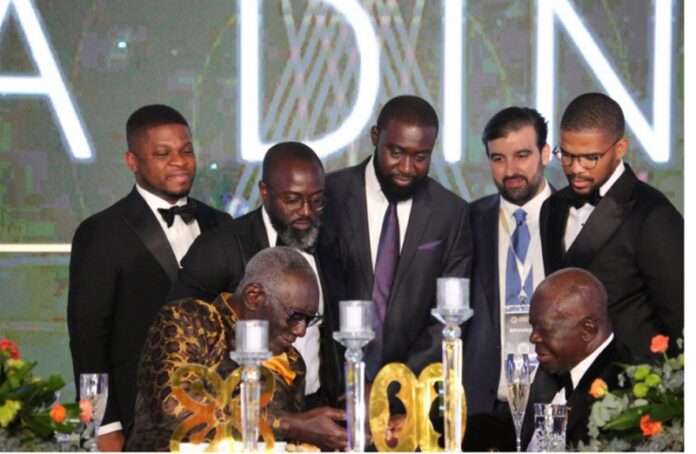Typhoon Greenfield Development Ltd and MKS PAMP, in collaboration with Development Gold International (DGI), have presented a limited edition of unique gold bars to commemorate the first export of fully traceable and responsibly produced gold sourced from Ghanaian small-scale mines.
The presentation was made to the King of the Ashanti Kingdom, Otumfuo Osei Tutu II, during the Mining in Motion summit at a gala dinner held at the Kempinski Hotel Gold Coast City, Accra.
Six bars were donated for auction, with proceeds supporting Otumfuo Nana Osei Tutu II’s charities focused on land restoration and clean water conservation.
Also in attendance were prominent figures including Emmanuel Armah-Kofi Buah, Ghana’s Minister of Land and Natural Resources; Kenneth Zikhale Ng’oma, Minister of Mining, Republic of Malawi; Colonel Ousmane Abarchi, Minister of Mines, Republic of Niger; Wilmot Paye, Minister of Mines, Liberia; Godard Gibolum, Deputy Minister of Mines, DRC; Aboubacar Kourama, Vice Minister of Mines, Guinea-Conakry; Abdiwahab Abdi Omar, Deputy Minister of Mineral Resources, Republic of Somalia; Sammy Gyamfi, CEO of Ghana GoldBoard; and Cisse Vakabe, Mining Advisor to the President of Côte d’Ivoire.
In a historic partnership between Typhoon Greenfield Development Ltd, MKS PAMP, and DGI, backed by the London Bullion Market Association (LBMA), the first 445 grams of gold were produced at Typhoon Greenfield’s Adomanu mine and exported for refining at MKS PAMP facilities in Switzerland.
This milestone occurred under the DGI initiative, which enables small-scale mining operations to meet international standards, specifically the Development Gold Ghana Performance Standard and the LBMA Responsible Sourcing Programme.
This achievement marks the culmination of years of collaborative efforts and signals a new era in formalising the small-scale mining sector, positioning Ghana as a credible source of LBMA-compliant gold from small-scale mining entrepreneurs.
Max Afriyie-Barwuah, President of Development Gold International (DGI), said: “This is a major milestone in the Ghanaian gold industry that has been many years in the making, working with mines in the field to build their technical capacity to meet international standards. It signals the serious intention of small-scale miners in Ghana to meet international standards and of LBMA Good Delivery List (GDL) refiners to recognise Ghana as a source of formal and responsible gold from small-scale mines. Our goal is to reduce environmental degradation and enable these miners to access responsible gold markets globally at scale.”
Kwaku Afrifa Nsiah-Asare, CEO of Typhoon Greenfield Development Ltd, added: “We are thrilled to pioneer this home-grown Ghanaian responsible mining initiative and to be the first small-scale mining business to have our operations assessed against the Development Gold Ghana Performance Standard. This has opened opportunities to work with respected businesses in the international gold market such as the LBMA GDL refinery, MKS PAMP. Partnering with DGI has helped us build our team’s capacity and enhance our operating systems for greater efficiency and management of environmental and social aspects. I expect others to follow and for the formalisation of small-scale mining in Ghana to scale rapidly.”
Omar Liess, Chief Commercial Officer of MKS PAMP, said: “This partnership represents a significant step forward for responsible sourcing in Ghana’s artisanal and small-scale mining sector. We’re proud to support this initiative and look forward to continued collaboration with our partners in Ghana to scale these efforts and inspire similar initiatives globally.”
Ruth Crowell, Chief Executive of the LBMA, said: “The LBMA is encouraged by this announcement. This is exactly the kind of initiative LBMA supports. Ghana is paving the way for similar arrangements between small-scale producers working with GDL refineries in other countries.”
DGI’s Development Gold Ghana Performance Standard was developed in collaboration with mining industry experts at TDi Sustainability to independently assess and verify the responsible practices of small-scale gold miners.
The standard aims to create opportunities for Ghana and other nations to redefine small-scale gold mining, which has historically been associated with illegal mining and environmental, social, and governance (ESG) issues such as deforestation, pollution, water contamination, habitat loss, safety risks, and social instability.
The initiative not only enhances the traceability of the gold supply chain through DGI’s tech platform, MineTrace, but also ensures mining practices are environmentally sustainable and socially responsible.
Assheton Carter, Executive Chair of TDi Sustainability, said: “DGI is doing something very important by providing an indigenous, Ghana-appropriate, progressive good-practice framework that facilitates mine-site improvements at small-scale mines. It creates an assurance process to demonstrate compliance with international due diligence expectations and offers technical assistance and capacity development to uplift this vital sector. TDi has a long history of developing responsible value chains for minerals, especially ASM gold. It is never easy and takes time—in this case, four years of hard work on the ground. We are incredibly proud to be involved in the launch and roll-out of this truly African initiative.”
The LBMA launched its responsible artisanal and small-scale mining (ASM) programme in 2022, aiming to facilitate more responsibly sourced ASM gold into the LBMA Good Delivery List (GDL).
Ghana was identified as one of four countries globally showing the most promise for increasing the flow of responsibly produced ASM gold to GDL refineries.
Since 2023, the LBMA has engaged with Ghana’s government, mines, traders, and the Bank of Ghana to promote responsible ASM sourcing, and published an ASM Toolkit for GDL refineries to guide them in progressive improvement systems rather than mere compliance.



